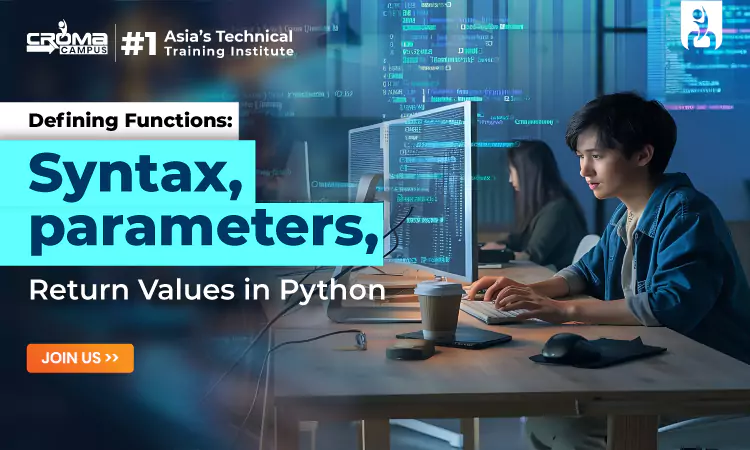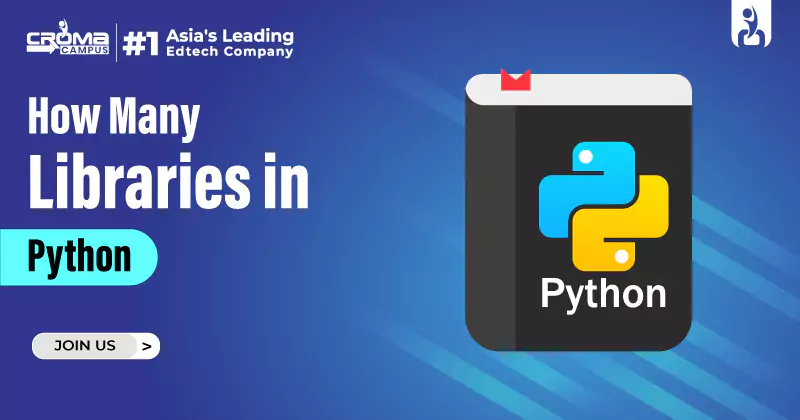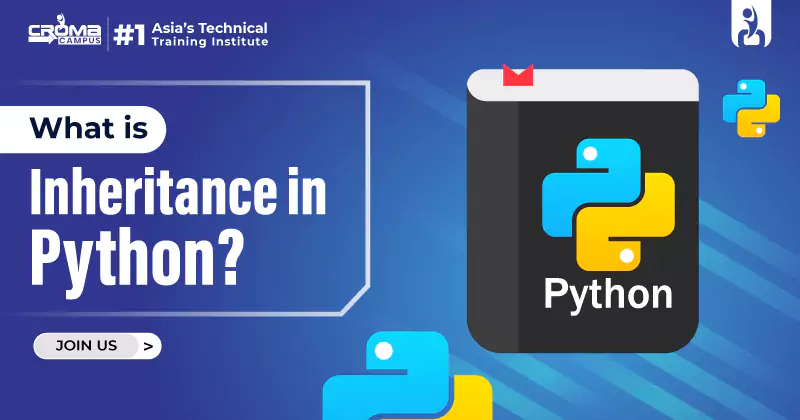Defining Functions: Syntax, Parameters, And Return Values In Python
4.9 out of 5 based on 457421 votesLast updated on 20th Aug 2024 5.6K Views
- Bookmark

Learn how to define functions in Python, understand syntax, handle parameters, and utilize return values for efficient, reusable code in your projects.

Functions are a fundamental concept
in programming that allow you to encapsulate code into reusable blocks. In
Python, functions enable you to organize your code, reduce redundancy, and
improve readability.
This blog will explore the syntax for
defining functions, how to use parameters, and how to handle return values in
Python.
Additionally, we’ll highlight the
benefits of enrolling in a Python
Programming Course to deepen your understanding and proficiency.
What is a Function?
A function is a block of organized,
reusable code that performs a single action or related group of actions.
Functions help break our program into smaller and modular chunks, making the
code easier to manage, understand, and debug.
Basic Syntax of a Function
In Python, a function is defined
using the def keyword followed by the function name, parentheses (), and a
colon (:). The code block within the function is indented.
Syntax:
In this example:
- def greet(): defines a function named greet.
- print("Hello, World!") is the body of the function.
- greet() calls the function, resulting in the output Hello, World!.
Parameters in Functions
Parameters are variables that you can pass to a function to customize its behavior. Parameters are specified within the parentheses in the function definition.
Note: Python is used in multiple technologies, like full-stack, data analytics, and many more. If you want to build your career in full stack and are looking for a Full Stack Developer in Python Course, do visit Croma Campus
Example with Parameters
In this example:
- def greet(name): defines a function that takes a single parameter
name.
- print(f"Hello, {name}!") uses the parameter to print a
customized greeting.
- greet("Alice") calls the function with the argument
"Alice", resulting in the output Hello, Alice!.
Types of Parameters
- Positional Parameters: The most common type, where
the order of the arguments passed matters.
- Keyword Parameters: Parameters that are passed by
explicitly specifying the parameter name.
- Default Parameters: Parameters that assume a
default value if no argument is provided during the function call.
- Variable-Length Parameters: Parameters that allow a function to accept an arbitrary number of arguments.
Tips: Python Data Science is revolutionizing industries by enabling data analysis, visualization, and predictive modeling. Enroll in Python Data Science Training to master essential skills and unlock endless career opportunities.
Example of Different Parameter Types
In this example:
- animal_type="dog" is a default parameter.
- describe_pet("Willie") uses the default value for
animal_type.
- describe_pet(pet_name="Harry",
animal_type="hamster") uses keyword arguments.
Variable-Length Parameters
- Arbitrary Positional Arguments: Use *args to accept
any number of positional arguments.
- Arbitrary Keyword Arguments: Use **kwargs to accept any
number of keyword arguments.
Example:
Note: Java programming is a versatile, platform-independent language ideal for building applications. Enroll in Java Online Training to master core concepts, advanced topics, and real-world development techniques effectively.
In this example:
- *toppings collects all additional arguments into a tuple.
- The function can handle an arbitrary number of toppings.
Return Values
Functions can return values using the
return statement. This allows a function to send back a result to the caller,
enabling further processing or use.
Example with Return Values
Tips: Master coding with a Python Course in Delhi, covering data science, automation, and web development. Gain hands-on experience and industry-relevant skills for career growth.
In this example:
- def add(a, b): defines a function that takes two parameters and
returns their sum.
- result = add(3, 5) stores the returned value in result.
- print(result) outputs the result.
Returning Multiple Values
A function can return multiple values
as a tuple.
Example:
In this example:
- return name, age returns a tuple.
- user_name, user_age = get_user_info() unpacks the returned tuple into separate variables.
Note: Croma Campus is one of the leading EdTech companies for providing Web Development Online Course. You can check the details about the course, fees, and duration.
Practical Applications of Functions
Functions are used in various
scenarios, including:
- Code Reusability: Avoid duplicating code by
reusing functions.
- Modularity: Break down complex problems into simpler,
manageable pieces.
- Maintainability: Easier to update and debug
code organized into functions.
- Testing: Functions can be tested independently,
enhancing code reliability.
Example: Temperature Conversion
In this example:
- celsius_to_fahrenheit converts Celsius to Fahrenheit.
- fahrenheit_to_celsius converts Fahrenheit to Celsius.
Enhancing Your Python Skills
To master functions and other Python concepts, consider enrolling in a Python Course in Noida. These courses offer structured learning and hands-on practice, guided by experienced instructors.
You May Also Read:
Python Programming for Beginners
Python Interview Questions and Answers
Data Science Interview Questions and Answers
Tips: Python is a versatile language used for automation, data science, and web development. Our Advanced Python Programming Course enhances skills in AI, APIs, and performance optimization.
Benefits of a Python Programming Course
- Structured Learning: Follow a well-organized
curriculum that covers essential topics systematically.
- Expert Guidance: Learn from experienced
instructors who provide insights and real-world examples.
- Practical Experience: Engage in hands-on projects
and assignments to apply what you’ve learned.
- Comprehensive Coverage: Courses cover everything from
basic to advanced Python topics.
- Certification: Gain a recognized
certification to enhance your resume and career prospects.
Benefits of Python Course
- Local Networking: Connect with peers and
professionals in the area, enhancing your learning experience.
- Interactive Sessions: Participate in classroom
settings that provide opportunities for direct interaction with
instructors.
- Access to Resources: Utilize local resources and
facilities for a more immersive learning experience.
- Placement Assistance: Benefit from support in
finding job opportunities after course completion.
- Convenient Location: Ideal for residents of Noida and nearby areas, offering easy access to classes.
Note: Java Full Stack development covers front-end, back-end, databases, and deployment. Enroll in a Java Full Stack Developer Course Online to master end-to-end web applications.
Why Choose Croma Campus?
Croma Campus is a leading provider of
IT training courses, including Python. Here’s why you should consider Croma
Campus for your Python training:
- Experienced Trainers: Learn from industry experts
with extensive experience.
- Comprehensive Curriculum: Courses cover all aspects of
Python, from basics to advanced topics.
- Hands-On Training: Gain practical experience
through real-world projects.
- Flexible Learning Options: Choose from online or
classroom courses to suit your schedule.
- Certification: Earn a recognized
certification that enhances your career prospects.
- Placement Support: Benefit from job placement assistance to kickstart your career.
Other Related Online Courses:
Full Stack Data Science Course
Python Course for Data Science
Data Analytics Online Training
Artificial Intelligence Online Training
Data Engineer Course With Placement
Conclusion
Understanding how to define
functions, use parameters, and handle return values is essential for writing
efficient and modular Python code. By mastering these concepts, you can create
reusable code blocks that simplify your programs and make them easier to
maintain.
Enrolling in a Python
Certification Course can help you gain a deeper understanding of
these topics, guided by experienced instructors and hands-on practice. Choose
Croma Campus for a comprehensive learning experience that will prepare you for
a successful career in Python programming.
Subscribe For Free Demo
Free Demo for Corporate & Online Trainings.
Your email address will not be published. Required fields are marked *






















 Master in Cloud Computing Training
Master in Cloud Computing Training